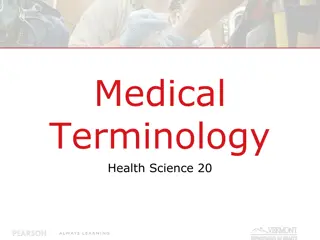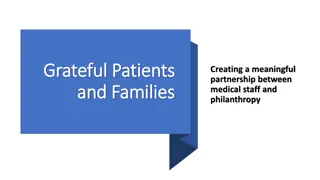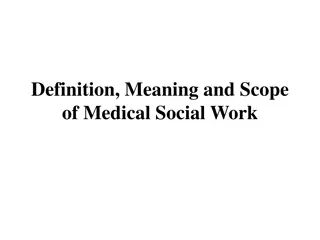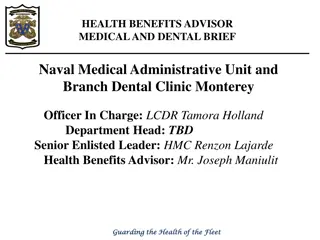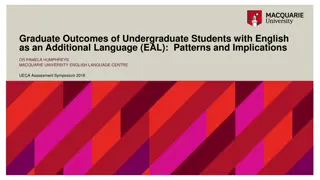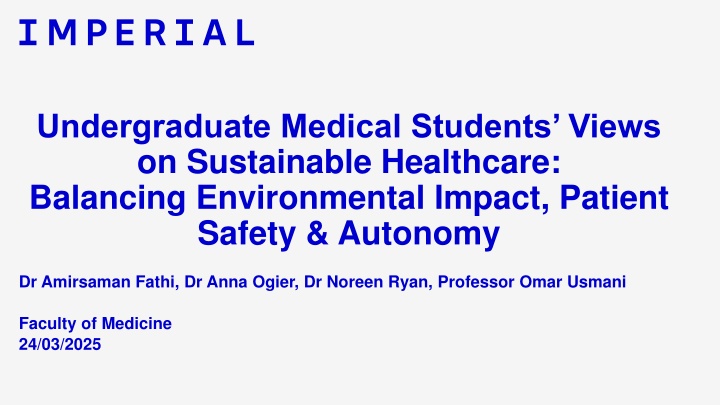
Undergraduate Medical Students' Insights on Sustainable Healthcare Practices
Explore the views of undergraduate medical students on balancing environmental impact, patient safety, and autonomy in healthcare. Significant carbon emissions from healthcare systems and the importance of embedding sustainability in clinical practice are highlighted. Initiatives in respiratory medicine to reduce greenhouse gas emissions are discussed, along with the impact of incorporating 'Sensible Sustainability' into the medical curriculum on students' attitudes towards sustainable healthcare.
Download Presentation

Please find below an Image/Link to download the presentation.
The content on the website is provided AS IS for your information and personal use only. It may not be sold, licensed, or shared on other websites without obtaining consent from the author. If you encounter any issues during the download, it is possible that the publisher has removed the file from their server.
You are allowed to download the files provided on this website for personal or commercial use, subject to the condition that they are used lawfully. All files are the property of their respective owners.
The content on the website is provided AS IS for your information and personal use only. It may not be sold, licensed, or shared on other websites without obtaining consent from the author.
E N D
Presentation Transcript
Undergraduate Medical Students Views on Sustainable Healthcare: Balancing Environmental Impact, Patient Safety & Autonomy Dr Amirsaman Fathi, Dr Anna Ogier, Dr Noreen Ryan, Professor Omar Usmani Faculty of Medicine 24/03/2025
Healthcare Systems: Contribute a Significant Amount of Carbon Emissions If global healthcare was a country, it would rank 5th in greenhouse gas emissions (1) NHS: ~5% of the UK s carbon emissions, 3.5% of all road travel (2) NHS target: Net Zero by 2045 (3) 1. https://global.noharm.org/focus/climate/health-care-climate-footprint-report 2. https://www.imperial.nhs.uk/about-us/our-strategy/green-plan Imperial College London Festival of Learning and Teaching 2025 09/04/2025 2 3. https://www.england.nhs.uk/greenernhs/wp-content/uploads/sites/51/2020/10/delivering-a-net-zero-national-health- service.pdf
Clinical Practice: Growing Recognition of Importance of Embedding Sustainability 14. Make good use of resources taking into account responsibilities to patients and the wider population... 15. Choose sustainable solutions when you re able to, provided these don t compromise care standards GMC Good Medical Practice 2024 Imperial College London Festival of Learning and Teaching 2025 09/04/2025 3
Respiratory Medicine: Pressurised metered-dose inhalers (pMDIs) contain hydrofluorocarbon (HFC) propellants which contribute to Global Greenhouse Gas Emissions Current initiatives: Switch from pMDIs to DPIs to reduce environmental footprint However, this transition is not without risks Non-clinical switching risks exacerbations (1) Changing a patient s prescribed inhaler when their condition is stable on their current device National Medicines Optimisation 1. Usmani OS, Bosnic-Anticevich S, Dekhuijzen R, Lavorini F, Bell J, Stjepanovic N, Swift SL, Roche N. Real-World Impact of Nonclinical Inhaler Regimen Switches on Asthma or COPD: A Systematic Review. J Allergy Clin Immunol Pract. 2022 Oct;10(10):2624-2637. doi: 10.1016/j.jaip.2022.05.039. Epub 2022 Jun 22. PMID: 35750323. Imperial College London risks loss of disease control Festival of Learning and Teaching 2025 09/04/2025 4
Research Methods: How Does Incorporating 'Sensible Sustainability' into the Medical Curriculum Affect Medical Students' Attitudes Towards Sustainable Healthcare Third Year Medical students attended a one-hour lecture emphasising the integration of 'Sensible Sustainability' into healthcare decision-making. Post-session Questionnaire : evaluating attitudes, knowledge, and clinical decision-making skills in response to the intervention. Sensible Sustainability = Balancing patients' needs with critical analysis of sociopolitical issues Imperial College London Festival of Learning and Teaching 2025 09/04/2025 5
Results Summary: We recorded n=81 responses (of n=320 in Year 3). Balancing sustainability with patient-safety Integrating guidelines with shared decision- making Prioritise patient Autonomy Imperial College London
How Has this Lecture Impacted Your Attitude Towards Sustainability? Made me consider the balance between patient safety and the environment and how it makes sustainability in healthcare a far more complex issue to think about. Improved my attitude and also helped me understand to balance the patient needs with sustainability It s made me actually the importance of sustainability in healthcare and how it s important to actually understand and evaluate guidelines instead of just blindly following them How Has Your Approach to Managing These Types of Situations Changed After Attending This Lecture? I will always be mindful of the environmental impact but to remember to treat the patient's condition first Prioritise the patient there are other ways of benefitting the environment. There is no blanket treatment for asthma Good asthma control with an inhaler that works for them is not only better for patients but also better for the environment than prescribing an inhaler that might on its own be more environmentally friendly, but does not work for the patient and leaves their asthma uncontrolled Imperial College London Festival of Learning and Teaching 2025 09/04/2025 7
Summary Embedding formal sustainability education using inhalers, medical students demonstrated a nuanced approach to sensible sustainable healthcare, balancing environmental considerations with clinical priorities. Students emphasis on shared decision-making and patient-safety reflects their ability to critically appraise policies and integrate environmental responsibility into everyday patient-centred care. Future directions: Expand to other areas of the curriculum, incorporate further interactive sessions. Imperial College London Festival of Learning and Teaching 2025 09/04/2025 8
Thank You Any questions?
Results Summary We recorded n=81 responses (of n=320 in Year 3). Patient-safety was consistently prioritised over environmental concerns by 80.2% (n=65/81), autonomy by 12.5% (n=10/81), with 6.3% (n=6/81) favouring sustainability. When managing clinical uncertainty, 44% opted to follow guidelines, 38% emphasised patient needs , with 12% relying on clinical judgement alone. Presented with a scenario-based assessment prompting switching from a propellant-based metered-dose inhaler to a non-propellant dry-powder inhaler, 76.8% (n=43/56) opted to review the patient s asthma control before switching. Eight students (9.9%) rated their knowledge of sustainability as good (4-5/5) pre-session, increasing to 61.7% post-session (mean score pre-2.43 0.81 vs. post-3.68 0.70). Imperial College London Festival of Learning and Teaching 2025 09/04/2025 10





